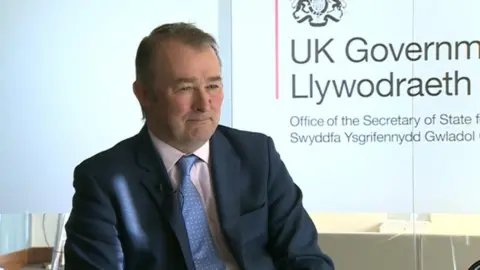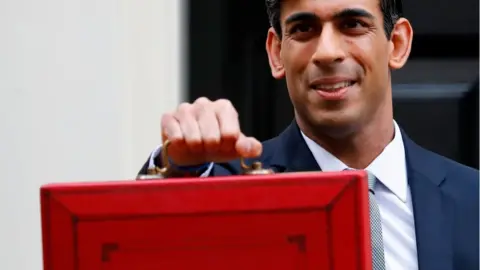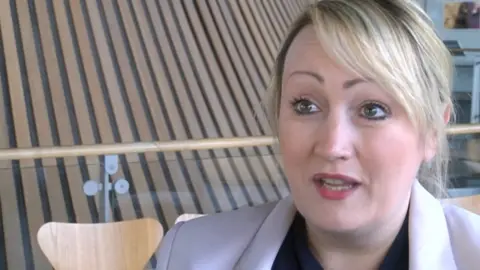Budget 2020: Criticism of extra money for Wales 'clutching at straws'
 BBC
BBCThe Welsh secretary has accused the Welsh Government of "clutching at straws" after it said extra money for Wales in the Budget would not reverse previous cuts.
On Wednesday, an extra £360m was announced for the Welsh Government.
Welsh Finance Minister Rebecca Evans said it "barely takes us back to where we were 10 years ago".
But Simon Hart said the plans meant Wales would get a "lot of money" for "the first time for a very long time."
The extra cash was on top of the £600m extra promised at the spending review last September.
 Getty Images
Getty ImagesOverall the Welsh Government will receive £12.8bn in 2020-21 for day-to-day spending, and £2.4bn for infrastructure.
The Welsh Government had said the £360m did not take into account a £100m cut the UK government made to the Welsh budget for infrastructure spending at the end of the financial year.
Speaking to the BBC's Politics Wales programme, Mr Hart said: "If the best that the Welsh Government can do is say 'well, it wasn't as good as it was decade ago' then I think that's clutching at straws.
"They complained about what commonly gets called austerity 10 years ago, which we considered was a necessary way of recovering a broken economy at that time and when we, in a sense, cancel austerity and say 'we're back to where we want to be, we're going to invest hundreds of millions of pounds in Wales', the same people complain," he said.
"What do they want?"
A Welsh Government source said: "It cannot be true that austerity has ended when funding for Wales has not risen above 2010 levels.
"The UK government can't have it both ways."
The Resolution Foundation think tank said the Budget did "almost nothing to offset the considerable welfare cuts put in place by [former Chancellor] George Osborne in 2015".
"These cuts mean the incomes of the poorest families have actually fallen over the past two years, and there is a risk that child poverty will reach record highs by the time of the 2024 election," the analysis added.

The proportion of children living in poverty in Wales has reduced to 29% and is slightly lower than the rate for the UK overall at 30%.
Despite that, 22% of children living in working families are in poverty.
A child is considered to be growing up in poverty if they are living in a household where the income is below 60% of the median income.
In response, Mr Hart said: "I do dispute this constant sort of negative refrain that somehow actually having an economy that works and which creates jobs doesn't have a consequential beneficial effect for people on benefits.
"Of course it does. We're funding public services so that we can make sure that people who are dependent on benefits or dependent on the welfare system or dependent on the health service are properly looked after.
"That's exactly what we're trying to do and actually the numbers underpin that.
Speaking to Politics Wales in January, the Welsh secretary said details would "emerge literally in weeks rather than months" on the Conservatives' plans to introduce a Shared Prosperity Fund to replace EU economic aid programmes after Brexit.
Asked why no there were still no details of the planned scheme, he said: "It's absolutely right that it is coming down the tracks.
"We have to agree it and we have to agree it with Welsh Government and we have to agree it in the timescale that we have.
"That hasn't changed since we last spoke and it probably won't have changed when we next speak either," he added.
BBC Politics Wales is on BBC One Wales at 10:00 GMT on Sunday 15 March and on the BBC iPlayer
